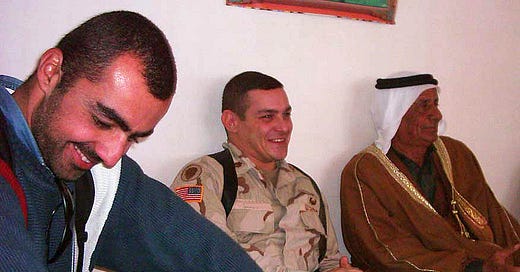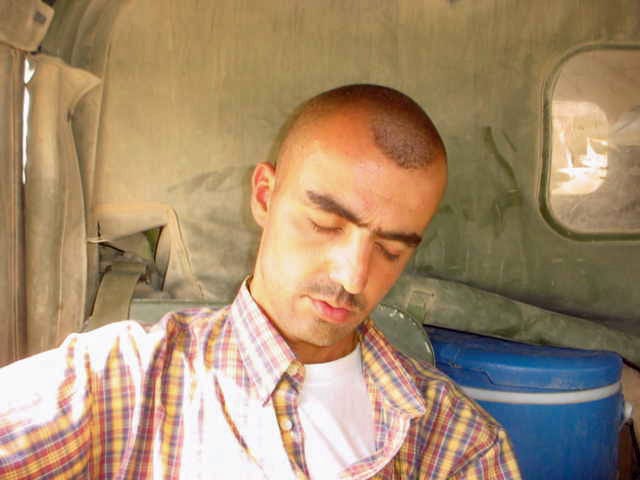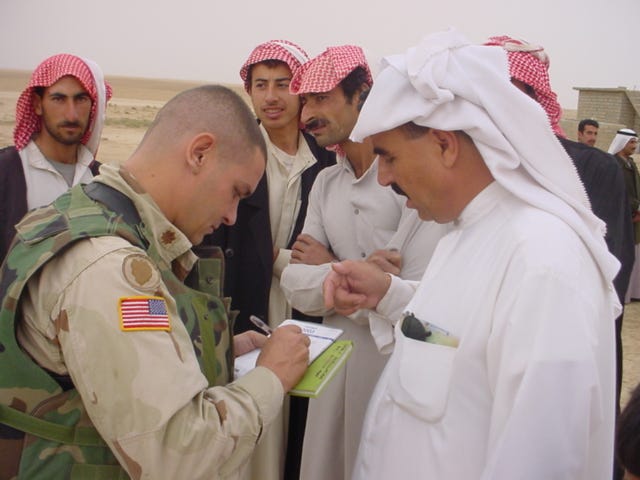Sunday Read: Sacrifice in war isn't just for soldiers
The story of a partner and friend who changed my life in unimaginable ways
You’re Uday aren’t you?
It’s interesting how you can meet people and not know how much they will change your life. You are going through your day-to-day journey and a person floats in and makes an impression that lasts a lifetime. You look back years later and see how life took a different direction from that moment.
One of those in my life was an Iraqi man named Bassam Sabri-Yousef and he looked way too much like Uday Hussein.
Bassam was my first interpreter in Iraq. He came into my life in June of 2003, after we’d already settled at Qayyarah-West Airbase on the famed Ninewa plains of northern Iraq. My unit of the 101st Airborne Division (Air Assault) had leapfrogged our way from Kuwait in the invasion and settled into Q-West in early May.
By the time Bassam joined my team I had already started visiting local villages and begun the process of getting to know our neighbors around the base. We were already getting to work on some rudimentary projects that would eventually lead to repairing roads, delivering fresh water, building schools and medical clinics.
We had been using pilots that spoke Arabic or locals that had randomly been assigned to help us, when each unit in the division finally got assigned an official interpreter. I went up to Brigade headquarters to meet my assigned local partner. I met a tall gentleman who looked just like Uday Hussein.
It would become an annoying and entertaining running joke with us. I used to tease him constantly at random times or when he disagreed with me on something. “But, seriously, you’re Uday, aren’t you?”
He would gently shake his head and softly say “No, Major Wellman, I am not Uday.”
Bassam was from Mosul. He was a Chaldean Christian, a dwindling population in Iraq dating back thousands of years. He owned a small store near Mosul University, where he and his wife had both graduated with English degrees. They had made the difficult decision to join the effort supporting the Americans came to earn extra money for his family and eventually immigrate to the United States.
Needless to say the Christians were persecuted to varying degrees at different times in Iraqi history and treated as a nuisance in that area for much of recent events. Many of them, including most of his wife’s family, had left the country already. Bassam was hoping to make enough money to give his family a safer life.
The partner I needed
He changed the whole direction for me in that region. Bassm understood that the job wasn’t just about translating the words. He got that better than I did frankly. What made Bassam such a critical partner for me was he understood that I needed to know the nuances, I needed to know what was being said even out of my earshot.
We developed such a working rapport that when I was in meetings with other Iraqis that spoke English, Bassam would sit on the other side of the room and listen to the sidebar Arabic conversations. He would give me a signal and I would let the group know I had to take a call outside in my vehicle or something. He would meet me and give me the scoop on the machinations that were going on.
Often, he would discover things like the contractor the villager leaders wanted to hire just happened to be the nephew of the sheikh himself or some other bizarre trick. In our very first engagement he tipped me off that the Iraqis planned to simply take our money and bulldoze dirt into the culvert to make us think they’d done the work.
That was invaluable information for me.
It’s better the sheep gets cold
He truly understood the tactical environment intuitively. I tell a story often of a day we found ourselves in a village in the southern part of our sector. It was part of our routine of visiting villages about three to four times a week.
The local sheikhs and leaders would visit with me often, we would meet in the village, eat some sheep, and talk about their needs. At that point the 101st Aviation Brigade was building a lot of stuff in the sector from schools, roads and clinics.
I had two things I carried with me everywhere: a notebook and a pocket calendar. The locals knew that if I put it in my notebook, it was tentative, but if I put a note in my calendar, it was official. Something Bassam had tipped me off to.
I was really tired this particular day, it had been a long week and I was worn out. I have a screwed up back and bouncing around all day in body armor in a HMMWV took it out of me. Several sheiks were there to meet me and ask for official visits to their villages. One was insistent and I said to Bassam, “Tell them that we will be there Thursday at 2:00,” and he said “No.”
I said, exasperated, “Bassam, just tell them 2:00.”
Once again, the quietly emphatic, “No.”
“Bassam, I’m so tired. It’s been a long day, just tell them.”
“Major Wellman, we do not know these men. We’ve never been here before; this is a very dangerous area.”
He was right, it was a dangerous area. This part of our sector was where the retired Baathists and former Air Force officers of the Iran/Iraq war had settled. It was rumored to be where multiple people in our famous deck of wanted war criminals were hiding.
“We do not know these people; they could kill us.”
“I understand but this is a big deal to them, Bassam. They want to slaughter a sheep for us.”
He replied, “Major Wellman, It is better the sheep gets cold, than we get killed. I will tell them we will be there in the afternoon.”
I’ve used that phrase so often now. It’s wise to be cautious and know the risk.
It is better the sheep gets cold.
Bassam and I became very good friends. He built a store on our base, and a restaurant. We would sit and talk, and he would show me pictures of his family, his wife and two beautiful daughters. I would tease him that Iraqis never smiled for pictures. His wedding looked like he was going to a funeral.
I left Iraq in March of 2004 at the end of my deployment. In September, Mosul began to fall to insurgents. One day, Al-Qaeda terrorists went to Bassam’s shop and kidnapped him. He was missing for three days. I was getting frantic emails from Iraq from my successor at Q-West.
I would find out later they had his cell phone and were calling his wife. She told me they were just kids. They taunted her and the others in his address book on the phone.
I lost sleep for days.
Eventually, the horrifying news came with a CD being circulated in the market. They had beheaded him on camera. He was gone.
They called his wife and other interpreters in his phone and told them, “You’re next.” They fled in fear for their lives.
Get them out
My fellow officer at Q-West truly stepped up and with the help of former congressman Duncan Hunter Sr., and others we were able to arrange to get Bassam’s widow and children to the United States as humanitarian parolees. That gave them six months to recover and be safe. They could not apply for asylum or get any government benefits in that time.
They arrived the day I landed back in Iraq for my second tour.
But, as these things sometimes go, at six months and one day, she asked for asylum in the U.S. I was proud to be one of her asylum sponsors. She and her two beautiful girls have thrived in the U.S. and are all American kids now.
We are still family today but that’s a story for another time. For now I want you to know about Bassam. A man who stepped up for his family and his country and paid the ultimate sacrifice.
He taught me what sacrifice truly means.









May his soul rest in peace! His daughters must be proud and they are so for sure.
Bassam is one of many many great men who had no fault but being the right ones in the wrong place, and time, and living in a barbaric society.
Bassam’s story and the others’ stories must be told and included in the military and other social institutions.
United States government should re-bridging ties with those who did not get the chance to be settled in the US or at least get them a pro-US community that can be supportive in too many fields. Now, many political and religious propaganda works tirelessly to show the black side of the US by blaming them for the consequences of the war even now after 20 years of the invasion/ or liberation so to speak. I may agree partially with them that the US did a huge mistake in its war on Iraq, but here I’m not talking about the war decision itself rather than the after-war phase in which the insurgency was created by the Sunnis first and subsequently by the Shiite. The US Army is the most polite institution I’ve ever seen. They were always keen to go through the IEDed streets and walk in the abandoned villages just to meet the people and to provide them with services and projects. This great job was made by the US Army and should be told to all. The world should know what the US Army has been through instead of focusing on the political side that would unmistakably show the other face of the US.
I wish you all the best, Wellman (my boss). Proud I have been a member of your team, even if not for very long, but it was much enough to get a lot of lessons.
Bassam’s story is one of sacrifice & honor, & it needs to told. Thank you for the privilege of reading it, & now knowing something about this selfless, courageous man. May his family thrive, & always be welcome here.